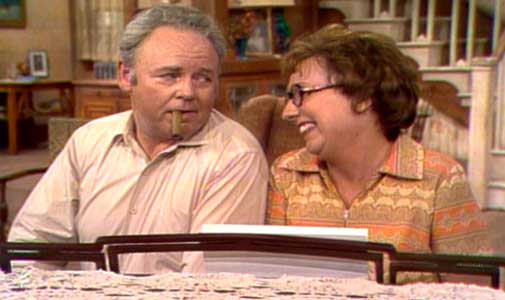
Hard to believe, but the pioneering CBS sitcom All in the Family turns 40 years old Wednesday, having premiered as a midseason entry with a timid disclaimer on January 12, 1971. Harder to believe, but some of the stuff in that pilot wouldn't pass today's politically uber-correct prime-time broadcast TV standards...
The history of All in the Family, in which Carroll O'Connor embodied one of television's most original and iconic roles as cab-driver bigot Archie Bunker, is as unusual and unlikely as the series itself.
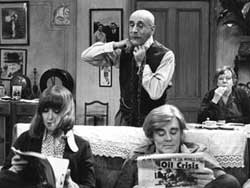
A British series called Till Death Us Do Part, about a mouthy, conservative bigot (Warren Mtchell as Alf Garnett) with a wife, daughter, and live-in liberal son-in-law, was a hit overseas in 1965. Producers Norman Lear and Bud Yorkin thought the premise of the series would work well if adapted for American audiences, in the same way The Office, American Idol and other transplanted shows are today.
It took a few tries, a few different pilots, and a few pitches to a few different networks, but eventually CBS put the show on the air.
Ironically, the network executive who made the decision to fly in the face of TV conservatism was Robert S. Wood, the very same executive who, newly promoted at CBS in 1969, had fired the Smothers Brothers for doing the same thing. Yet less than two years later, Wood felt the time was right for a bold new kind of comedy, and All in the Family certainly provided it.
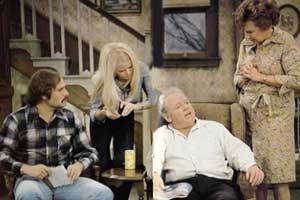
Co-starring with O'Connor were Jean Stapleton as Archie's subservient wife, Edith; Sally Struthers as their grown daughter, Gloria; and Rob Reiner as Gloria's husband, Mike, a liberal thinker whom Archie called Meathead, just as he called his own wife Dingbat. Most episodes had Archie and Meathead, especially, fighting about current events and issues -- rather than ignoring them, as most TV did at the time, All in the Family hit them head on.
By fall 1971, it was the No. 1 hit on television. And throughout the 1970s, it spawned one successful spinoff after another, including The Jeffersons (about Archie's former neighbors), Maude (about Archie's ultra-liberal cousin), and Good Times (about Maude's former maid), all hits.
Norman Lear sort of took over comedy TV in the 1970s, and maintained a strong foothold on the genre until Bill Cosby came along and took control in 1984 with The Cosby Show. Some of Lear's shows don't age well, while others are surprising, even shocking, in the language and subjects they present.
In my 1992 book Teleliteracy: Taking Television Seriously, I interviewed, among others, Norman Lear, Bill Cosby, and Mary Tyler Moore and Simpsons co-creator James L. Brooks, all of whom had intriguing takes on All in the Family and, in particular, the character of Archie Bunker.
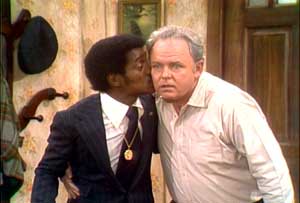
Lear thought the laughs in the show would hold up ("Foolish human behavior is eternal"), but didn't necessarily think the show itself would -- and was surprised its reputation had lasted a generation. (Now, it's lasted two, and counting -- and a quick look at the brilliant episode in which Sammy Davis Jr. visits suggests it'll last a lot longer.)
"Nothing is made for posterity," Lear said. "That's a consummation devoutly to be wished."
Cosby's approach to TV comedy was directly and intentionally opposed to the kind of content he saw on All in the Family, which he considered detrimental to society.
"Archie never said he was sorry," Cosby said flatly. Cosby also was concerned that while many viewers got the satire behind Archie's bigoted remarks, other members of the TV audience were laughing with Archie, not at him.
"If you don't tell people that this guy needed some help!" Cosby said, adding, "And year after year, the jokes continued to flow. Yes, there was another viewpoint on the show, but that kind of flip-flopped so my man could get on with what he was doing."
Yet Brooks, whose keen sense of comedy includes both writing and directing the movies Terms of Endearment, Broadcast News and As Good As It Gets, watched the same show but had a vastly different reaction.
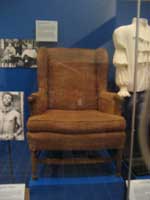
All in the Family, Brooks told me, contained "very literate observations about the life of anybody who's grown up in a lower-middle class background, as I did and a lot of other people did. And you know, Archie's chair was an observation that nobody made in any other place -- and I don't know any home of my class that didn't have that one reserved seat that was for the leader of the household."
Archie's chair, by the way, is still around. It's on exhibit -- in the Smithsonian.
Happy 40th, Archie.